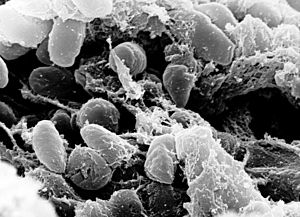Yersinia facts for kids
Yersinia is a group of tiny living things called bacteria. They are part of a big family of bacteria known as Enterobacteriaceae. Some types of Yersinia can cause sickness in people and animals.
Quick facts for kids Yersinia |
|
|---|---|
 |
|
| Scientific classification | |
| Kingdom: | |
| Phylum: | |
| Class: | |
| Order: | |
| Family: | |
| Genus: |
Yersinia
van Loghem, 1944
|
| Species | |
|
Y. aldovae |
|
Contents
What are Yersinia Bacteria?
Yersinia are a type of bacteria. Bacteria are very small, single-celled living things. Many bacteria are harmless, and some are even helpful. However, some types of Yersinia can cause diseases. They are found all over the world.
Types of Yersinia
There are many different kinds, or species, of Yersinia. Most of them do not cause sickness in humans. But a few species are known to cause health problems. The most famous one is Yersinia pestis. Another important one is Yersinia enterocolitica.
Yersinia pestis: The Plague Bacterium
Yersinia pestis is a very well-known type of Yersinia. This bacterium is famous for causing the bubonic plague. The bubonic plague was a very serious and often deadly disease. It caused huge outbreaks in the 18th century and earlier. These outbreaks were sometimes called the "Black Death."
The plague is mostly spread by fleas that live on small animals like rats. When an infected flea bites a person, the bacteria can enter the body. Today, the plague is rare. If it does happen, doctors can treat it with special medicines called antibiotics.
Yersinia enterocolitica: A Common Cause of Sickness
Yersinia enterocolitica is another type of Yersinia that can make people sick. It causes a disease called yersiniosis. This sickness usually affects the digestive system. People can get it by eating food or drinking water that has the bacteria in it. It can also spread from animals to people.
Symptoms of yersiniosis often include fever, stomach pain, and diarrhea. Young children are more likely to get this infection. Most people get better on their own. Sometimes, doctors might give antibiotics for more serious cases.
See also
 In Spanish: Yersinia para niños
In Spanish: Yersinia para niños
 | John T. Biggers |
 | Thomas Blackshear |
 | Mark Bradford |
 | Beverly Buchanan |

